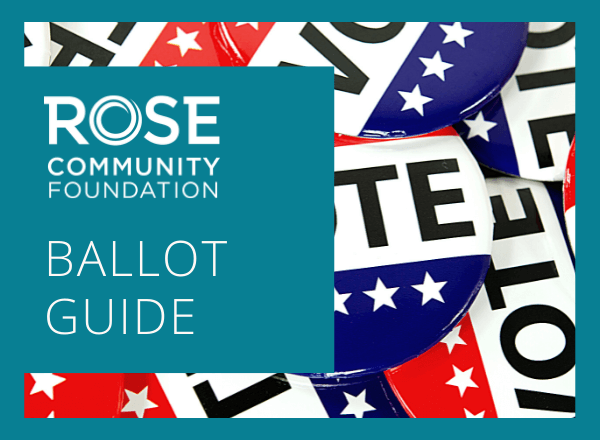Rose Community Foundation has taken a position on two Denver-specific and two statewide ballot measures that either advance or inhibit equitable and thriving communities. The Foundation’s endorsements are informed by our organizational values and guided by our strategic goals of creating more equitable and just systems and increasing resources devoted to mission-aligned public good.
The COVID-19 pandemic has exposed and exacerbated the challenges facing Greater Denver’s most underserved populations, and existing philanthropic and government resources are struggling to keep up with growing community needs. As our region begins plotting its course toward a new, more equitable “normal” that works for everyone, it is imperative that essential public policies, programs and services are available to assist those furthest from opportunity.
Read on to learn more about the specific ballot measures and our rationale for each position.
DENVER BALLOT MEASURES
Referred Question 2F: Group Living Ban
Rose Community Foundation OPPOSES Referred Question 2F. If passed, 2F would decrease the number of unrelated adults who are allowed to live together from five to two, making Denver’s group living law among the most restrictive in the country.
Prohibiting more than two unrelated adults from living together would significantly decrease opportunities for Denverites to share the costs of housing, making housing less affordable and restricting many lower- and middle-class people from being able to live in Denver. With already rising regional housing costs disproportionately impacting low-income and BIPOC individuals, this measure represents a regression to a less equitable, more exclusionary housing policy at a moment when our residents can least afford it.
Initiated Ordinance 304: Sales Tax Cut and Cap
Rose Community Foundation OPPOSES Initiated Ordinance 304. If passed, 304 would reduce sales taxes in Denver from 4.81 percent to 4.5 percent. It would also mandate that any future voter-approved sales tax increases be offset by additional budget cuts to keep the aggregate tax rate under the 4.5 percent cap.
304 would cost the city up to an estimated $80 million in tax revenue in 2022 and beyond, resulting in major cuts to essential services such as fire protection, housing and mental health supports, preschool and college tuition assistance, and road repairs. Blanket cuts to Denver’s budget and resident-serving programs, at a time when the city is doing all it can to recover from the pandemic’s varied impacts, would inequitably disadvantage underserved individuals who utilize sales-tax-funded services and programs. The revenue reductions would also directly override the will of Denver voters, who have approved many of the negatively impacted issue-specific funding streams.
STATEWIDE BALLOT MEASURES
Proposition 119: Learning Enrichment and Academic Progress (LEAP) Program
Rose Community Foundation ENDORSES Proposition 119. If passed, Prop 119 would provide financial credits of at least $1,500 (per child, per year) for out-of-school learning and development programs to low-income families with public-school children. The program would be funded by increasing the retail marijuana tax rate from 15 percent to 20 percent.
Pandemic-induced school closures have increased many students’ need for tutoring, special education supports and other out-of-school learning services, but such resources have historically been luxuries largely afforded to children from more affluent backgrounds. By empowering families with direct financial assistance, the LEAP program increases access to enrichment opportunities for students from all backgrounds, helping to close the opportunity gap for Colorado kids.
Proposition 120: Property Tax Cut
Rose Community Foundation OPPOSES Proposition 120. If passed, Prop 120 would reduce the assessment rate for commercial properties from 29 percent to 26.4 percent and reduce the residential assessment rate from 7.15 percent to 6.5 percent.
This across-the-board cut to property taxes would reduce state revenue annually by an estimated $1.2 billion, significantly exacerbating Colorado’s fiscal challenges. The measure would undercut future investments in already underfunded areas like education and transportation, especially in less wealthy localities that rely on targeted state funding to reduce inequities.
Even if passed, it is unlikely Prop 120 would be implemented in full due to Senate Bill 21-293, a recently passed state law that limits assessment rate cuts to only multi-family properties and lodgings. However, the Foundation still believes it is important to oppose this attempt to slash state revenue needed to help our most impacted communities recover from the pandemic and related educational and economic disruptions.

